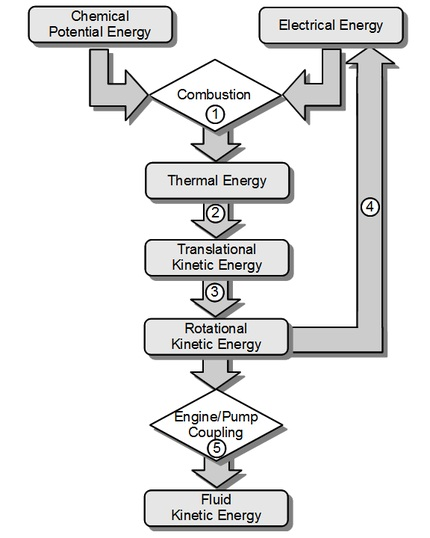Some Deficiencies in the Common Perception of Efficiency
The efficiencies of various energy systems including various kinds of energy inputs and outputs can’t be compared directly. For illustration, the typical ‘efficiencies’ of fossil-fuel-fired electricity producing plants and electric hot water heaters are in the range of 40 and 80%, correspondingly. Does this mean that electric hot water heaters are more nearly perfect than electricity-producing plants? The fact of the matter is that whereas the former include work to heat conversion, the latter include the sequential translation of chemical energy of fuel to sensible enthalpy of steam to mechanical work, eventually to electrical work (as shown in figure below). The second law allows 100% conversion of work to heat, though limits the effectiveness of conversion of heat to work to a value that is less than 100%; the actual value is dependent mainly on the heat source and sink temperatures. Moreover, when the effectiveness of thermal power generation is involved in assessing the performance of the electric hot water heater, then the total application efficiency might drop to around 30%, that illustrates it to be not so ideal after all.

‘Efficiency’ entails a maximum value of 100%, causing us to create new names when it emerges to exceed 100%. Such a point of view is depending on its interpretation as the ratio of ‘what we want’ to ‘what we have to pay for’. For illustration, the parameters for charging the performance of electric refrigerators and heat pumps are elected as ‘coefficients of performance’, as they can and generally have values bigger than 1. It is only whenever both the outputs and inputs are energies of similar ‘quality’ as in the situation of electric motors and generators, which the concept of efficiency might be expected to be clearly valid.
It is mainly significant to be careful in stating efficiencies, as they not only serve to compare various energy systems though also give guidelines for allotment of fiscal resources for attaining energy resource conservation. Even nowadays, it is just the first law that is used for this reason, while it will be shown later that not only does it give rational guidelines for energy resource conservation, though also leads to wrong conclusions and choices. The simultaneous consideration of the second law is necessary for acquiring the proper viewpoint.